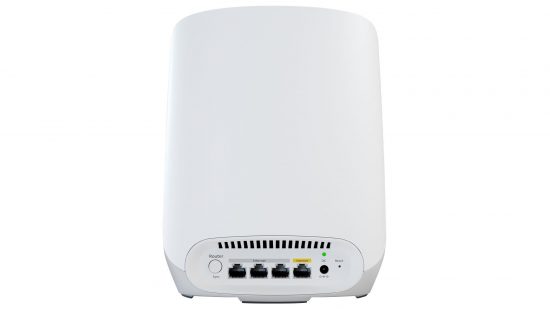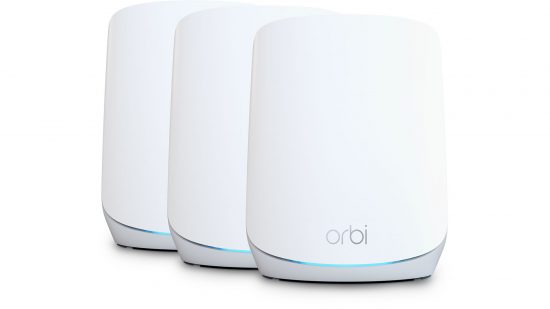Our Verdict
72%This three=Massive Wi-Fi range and speed, but it doesn’t come cheap.
As with other Netgear Orbi systems, and unlike most other mesh router systems, the RBK763S doesn’t contain three identical units that can be configured to work together in a mesh network. Instead, there’s a dedicated router unit and two satellite units that can be added to the router’s network. The units look largely identical, with a fetching matt white and grey exterior, plus a tall, slim design. They’re a little top-heavy, though, and there are no options for wall mounting.
The router unit houses four Gigabit Ethernet ports, three of which are for plugging in other devices and the fourth is for connecting to your internet connection. Meanwhile, each satellite unit gets two Ethernet ports. All the units also have a sync button for easy connection or reconnection of satellites. Notably, there are no 2.5Gbps or 5Gbps Ethernet ports, or any USB ports, so there are no means to share printers, hard drives, or any other USB devices.
Setup can be exceedingly simple, as the three are all synced together already, so there’s no long-winded process of adding each unit as on some mesh systems. You just need to log in to the router to setup your internet connection and change the admin password.
This can be done either via the Orbi app phone app (scan the QR code on the router), or you can log in via its web interface. The latter is a feature several other mesh systems don’t offer and it’s a boon if you won’t want a Netgear account – it’s an entirely local login.
Most standard security and system setup functions are included. However, you have to sign up for the Armor security platform (free for the first year, then $85 per year) to get active threat detection and blocking. Parental controls including blocking specific websites is also another $50, which is a bit of a stretch.

On the plus side, we love Netgear’s use of unique (but easy to remember) default network passwords in the format wordwordnumber, such as fishpickle5675. They’re printed on each unit for quick reference – it’s less secure than setting your own password but a better compromise than having the same default ‘password’ code on each unit.
Meanwhile, WiFi performance is as impressive as you’d hope for the high price. Each unit houses a 600Mbps 2.4GHz radio and two 2400Mbps 5GHz radios, providing seriously speedy coverage. The whole system is only Wi-Fi 6 rather than 6E, but 6E is far from a necessity in most real-world home situations.
We set up the router at the front of a small semi-detached house, the first satellite in the rear kitchen and the third unit in a shed 5m down a 20m back garden. Test locations were in the same room as the router, upstairs in a rear room, halfway down the garden and at the bottom of the garden.
We hit speeds as high as 730Mbps while in the same room as the router. Meanwhile, at every other test location other than the bottom of the garden, we also recorded over 500Mbps throughput with maximum pings of sub 30ms. At the final test location, the speed dropped to 380Mbps, with pings maxing out at 130ms, but still averaging under 30ms. That’s a massive range and impressive speeds.
Netgear Orbi RBK763S pros and cons
Pros
- Fantastic performance
- Wide range
- Easy setup
Cons
- Very expensive
- No USB ports
- No 2.5Gbps Ethernet support
Netgear Orbi RBK763S price
Price: Expect to pay $420 USD / £500 GBP
Netgear Orbi RBK763S review conclusion
Netgear’s latest Orbi mesh system is fast, reliable and easy to set up. However, it’s also very expensive – you can get perfectly decent coverage and speed from triple-unit systems costing well under $400 GBP, but if you can afford it the RBK763S is a superb setup.
